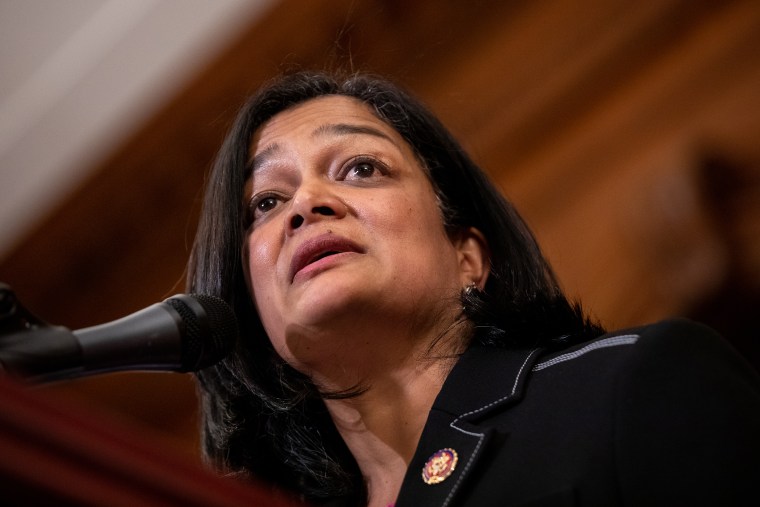Rep. Pramila Jayapal, D-Wash., interrupted Rep. Debbie Lesko, R-Ariz., to correct how Lesko pronounced her name during a Judiciary Committee hearing Tuesday about protests and the use of federal intervention in major cities.
In a video shared on Twitter, Lesko is heard asking Attorney General William Barr whether he agreed that there had been no takeover of the autonomous protest zone in Seattle.
Lesko asks: "Mr. Attorney General, is that your understanding of what happened there? Do you agree with Ms. Jayapal that there was no takeover, it was just —"
Jayapal interrupts, correcting Lesko's pronunciation of JAY-a-paul. She pointed out that it's pronounced JYE-ah-paul.
"Jayapal," she says. "If you're going to say my name, please say it right. It's Jayapal."
Lesko acknowledges her, repeating, "JYE-ah-paul," before proceeding with her question.
Jayapal has represented Washington's 7th Congressional District, including Seattle, since 2017. She is the first Asian American representative for Washington state and the first Indian American woman to serve in the House.
While mispronunciations can happen, Twitter users have pointed out that Lesko's error was directed toward a colleague. Given their professional relationship, proper pronunciation is expected, if not required, and many people of color said that they found the moment all too familiar and that they respected Jayapal's decision to speak up.
Experts said mispronouncing a name can be a form of racial microaggression.
Download the NBC News app for breaking news and politics
Rita Kohli, a race and ethnicity scholar at the University of California, Riverside, said last month that mispronouncing names is part of moving through a diverse, multilingual world. Pronouncing a name correctly the first time can be difficult without the proper tools, but mispronunciations and Anglicization of names can suggest that the dominant culture is superior and that assimilation is the best option, she said.
Catherine Ceniza Choy, a professor of ethnic studies at the University of California, Berkeley, said last month that names are crucial to a person's individual, family and ethnic identity. She said the simple act of learning people's names acknowledges their history and presence.
